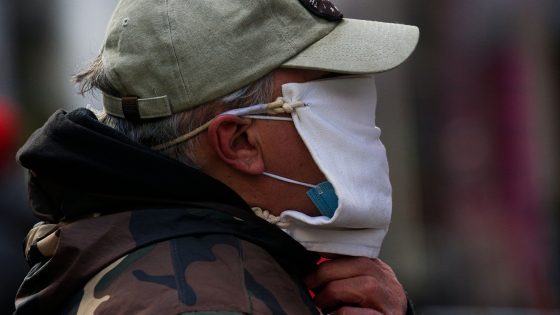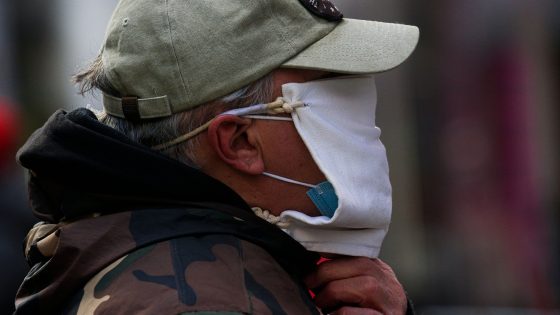A new study published in The Southern Medical Journal (SMJ) found that a county-wide mask order in Bexar County, Texas, did not lead to a reduction in COVID-19 hospitalization rates or deaths.
The study, which was peer-reviewed, analyzed data before and after mandates were imposed at both the state level (July 3, 2020) and in Bexar County (July 5, 2020), Texas’s fourth-largest county.
“We defined the control period as June 2 to July 2 and the post mask order period as July 8, 2020–August 12, 2020, with a 5-day gap to account for the median incubation period for cases; longer periods of 7 and 10 days were used for hospitalization and ICU admission/death, respectively,” the study authors wrote. “Data were reported on a per-100,000 population basis using respective US Census Bureau–reported populations.”
Authors of the study, which was reviewed by the US Army Institute of Surgical Research, analyzed the daily average number of COVID-19 cases, hospitalizations, ICU visits, patients on ventilators, and deaths, and concluded the policy did not reduce any of these metrics.
“All of the measured outcomes were higher on average in the post mask period as were covariables included in the adjusted model,” the researchers said. “There was no reduction in per-population daily mortality, hospital bed, ICU bed, or ventilator occupancy of COVID-19-positive patients attributable to the implementation of a mask-wearing mandate.”
Science of Masks Uncertain?
The SMJ research results come four months after the CDC published a large-scale study that found there was no statistically significant difference in COVID spread among children in schools where masks were optional compared to schools where masks were required.
That study analyzed roughly 90,000 elementary school students in 169 schools in Georgia in November and December 2020.
Other studies, however, have found masks reduce the spread of COVID-19, including a large-scale analysis from Bangladesh currently in preprint and under peer review at the journal Science.
“We now have evidence from a randomized, controlled trial that mask promotion increases the use of face coverings and prevents the spread of COVID-19,” said Stephen Luby, a professor of medicine at Stanford and co-author of the study.
Others, however, contest this conclusion.
The Bangladesh mask study does not show a statistically significant difference in the efficacy of cloth masks vs surgical masks. Based on the confidence intervals, both could be around 0% or both could be around 20%. https://t.co/N7d5biTWFG
— Martin Kulldorff (@MartinKulldorff) September 8, 2021
“The Bangladesh mask study does not show a statistically significant difference in the efficacy of cloth masks vs surgical masks,” Harvard epidemiologist Martin Kulldorff recently observed. “Based on the confidence intervals, both could be around 0% or both could be around 20%.”
A recent New York magazine article said conflicting research on mask mandates, combined with the absence of outbreaks in Europeans schools that do not require children to wear masks, suggests the science on masks “remains uncertain.”
Follow the Science?
In light of the unclear efficacy of masks and mask mandates as a mitigation to slow the spread of COVID-19, many would argue it seems both unscientific and unhelpful to compel people to wear masks. (People, of course, are free to wear face coverings if they wish.)
This, perhaps, is why many people are beginning to resist measures that require them to wear face coverings to attend local gatherings and public meetings.
— Carmen Krebs (@CarmenKrebs5) September 8, 2021
However, fewer may realize that mask mandates fall out of the purview of science even if research concluded they were effective at reducing the spread of COVID-19.
As the economist Ludwig von Mises (1881-1973) once observed, in the modern world science has long been invoked by the state to coerce and dictate the actions of individuals.
“The planners pretend that their plans are scientific and that there cannot be disagreement with regard to them among well-intentioned and decent people,” Mises wrote in his 1947 essay “Planned Chaos.”
Science, however, cannot answer moral questions or provide answers in the realm of subjective value judgments. It cannot tell us what we should do or what we must do.
“[T]here is no such thing as a scientific ought,” Mises wrote, echoing a famous argument by the philosopher David Hume. “Science is competent to establish what is.”
Much of the debate surrounding COVID-19 stems from the fact that public health officials have overstepped the boundaries of science. Instead of making public health recommendations based on scientific evidence, the state has begun to use the power of the law to coerce individuals into actions.
The results have been disastrous—and frightening.
Masks mandates, lockdowns, and other state-enforced “non-pharmaceutical interventions” may very well reduce the spread of COVID-19—though an abundance of scientific evidence suggests they do not do so effectively and come with unintended consequences, some of which are dangerous and deadly.
But don’t call these interventions “science.” As Mises rightly understood, there’s no such thing as a scientific ought.
This article was originally published by Matt Agorist at The Free Thought Project.



